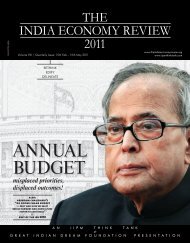Download - The India Economy Review
Download - The India Economy Review
Download - The India Economy Review
Create successful ePaper yourself
Turn your PDF publications into a flip-book with our unique Google optimized e-Paper software.
Constitution of <strong>India</strong> and<br />
Plan Process<br />
<strong>The</strong> Constitution lays down the basic<br />
structure of a nation's polity which is<br />
built on the foundations of certain fundamental<br />
values. <strong>The</strong> vision of the<br />
founding fathers and the aims and objectives<br />
which they sought to achieve<br />
through the Constitution are contained<br />
in the Preamble, the Fundamental<br />
Rights and the Directive Principles.<br />
<strong>The</strong>se three may be described as the<br />
nerve-centre of the Constitution and<br />
lately contended, Fundamental Duties<br />
has been given a thumbs up by adopting<br />
the principle of ‘basic structure’ theory<br />
of the Constitution enunciated by<br />
the Supreme Court in 1973 in Kesavananda<br />
Bharati vs. State of Kerala as<br />
reported in 1973 (4) SCC 228. As to<br />
what are these basic features, the debate<br />
still continues.<br />
<strong>The</strong> right to sustainable development<br />
has been declared by the UN General<br />
Supreme Court has, in a number<br />
of judgments, referred to the<br />
importance of the Directive Principles<br />
T RANSFORMATIVE PLANNING<br />
Assembly as an inalienable human right<br />
which recognizes that ‘human being is<br />
the central subject of the development<br />
process and that the development policy<br />
shall make the human being the main<br />
participant and benefi ciary of development’.<br />
“Development” is defi ned as a<br />
‘comprehensive economic, social, cultural<br />
and political process, which aims at<br />
the constant improvement of the well<br />
being of the entire population in development<br />
and in the fair distribution of<br />
benefi ts there from.<br />
<strong>The</strong> Supreme Court has, in a number<br />
of judgments, referred to the importance<br />
of the Directive Principles. It has called<br />
these principles the “conscience” of the<br />
Constitution and also as the core of the<br />
Constitution. <strong>The</strong>se principles are the<br />
“goals” to be achieved by Part III of the<br />
Constitution. <strong>The</strong>y are intended to ensure<br />
“distributive justice” for removal of<br />
inequalities and disabilities and to<br />
achieve a fair division of wealth amongst<br />
the members of the society. <strong>The</strong> Supreme<br />
Court held that the courts can<br />
look at the Directive Principles for the<br />
purpose of interpretation of the fundamental<br />
rights. <strong>The</strong> Courts will adopt that<br />
interpretation which makes the fundamental<br />
rights meaningful and effi cacious.<br />
<strong>The</strong> Courts have to make every<br />
attempt to reconcile the fundamental<br />
rights with the Directive Principles remembering<br />
that the reason why the Directive<br />
Principles were left by the founding<br />
fathers as non-enforceable was to<br />
give the Government suffi cient latitude<br />
to implement them.<br />
It may be particularly opined by almost<br />
all those who are concern that the<br />
Directive Principles cannot be confi ned<br />
to mere rhetoric or to ad hoc policies of<br />
electoral appeasement or handouts.<br />
THE INDIA ECONOMY REVIEW<br />
71





